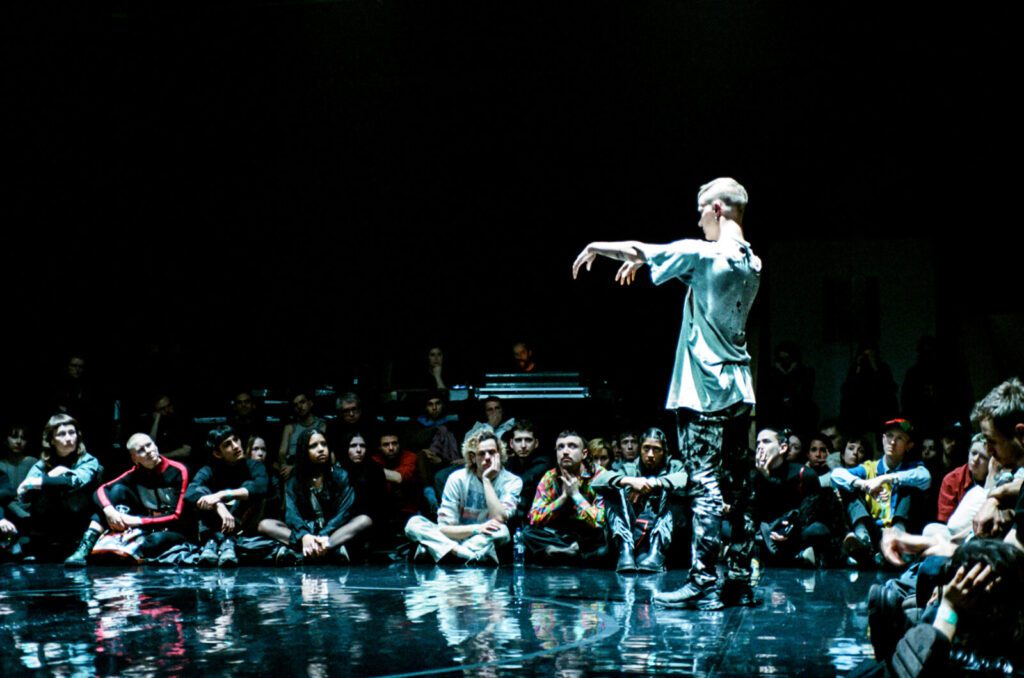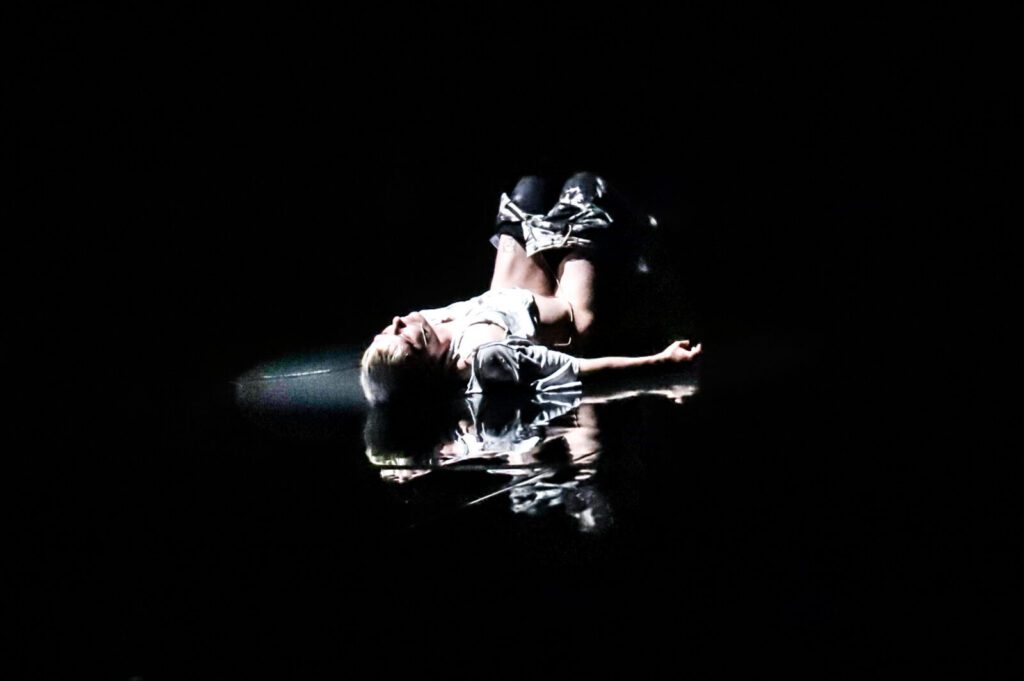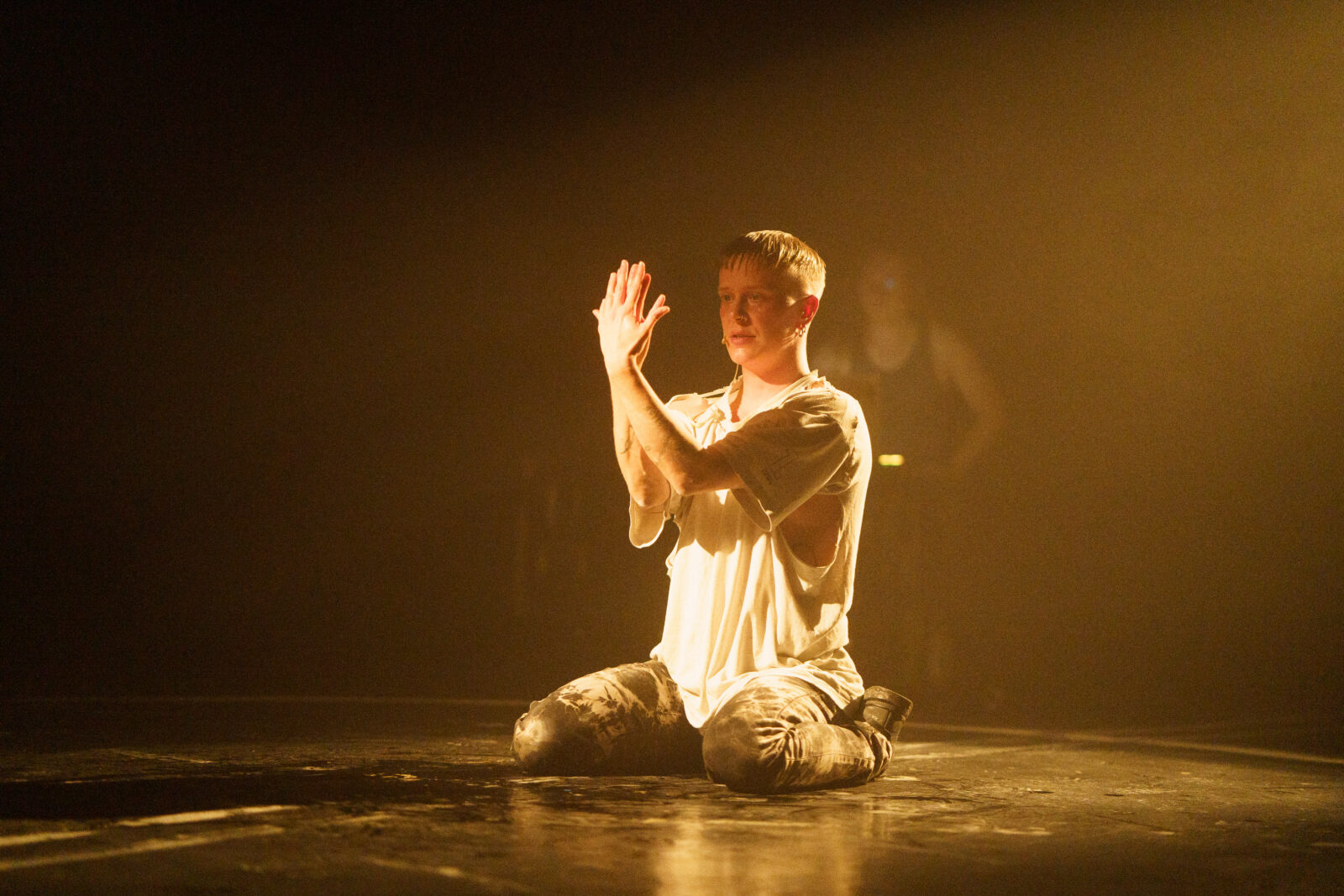It had not been my initial plan to write about Lacuna by Finnish Teo Ala-Ruona. I just wanted to check it out on a Thursday night and then return home to my bed, but the next day I find myself still thinking about the beautiful, bodily horror you could experience at the performance festival Managing Discomfort at Husets Teater.
Lacuna is presented as “an autofictional body horror performance that invites the audience into a void inside the performer’s body”. In the piece, Teo Ala-Ruona shares his memories of his body before the transition. He offers a vulnerable insight into having had a body that is no longer, but which was also never really his. In exchange for that gift, he gets the audience’s full attention.
The body that was once his becomes a ghost-like figure he brings to life on stage. His memories fill the space and take shape of zombie-like movements, gestures and intense facial expressions in a musical universe that plays with the horror genre as well as an intoxicating, almost ritual and sincere state of mind.
According to the Cambridge Dictionary, ‘Lacuna’ means “an absent part, especially in a book or other piece of writing”, but in the anatomy the word means a cavity between our organs. I imagine the void in my own body, an empty bubble floating inside me. Absence, emptiness and nothingness, I think at first. I misinterpret the gap as negation, as nothingness. But it is an opening, a cavity and not an empty space we are entering on the stage. A stage which is covered in black, smooth latex in a foggy, half-dark light.
Teo addresses the audience and invites us into his inner hole, which is reflected in a circle of white powder on the floor. The white powder is grainy and flies almost with Teo’s movements along the floor. He slowly blurs the otherwise sharp circle.

He talks about his childhood memories, funny baby pictures and most importantly: the teenage dream of sticking a hand through the skin and into the heart, tearing the heart out, placing the hand there instead, sticking the other hand deep through the mouth all the way down through the body and out of the anus and staying there for a while. It is like a weird variation of the fetal position or a waiting position before rebirth into a new body.
Time is circular. Paused. The cavity provides Teo’s former teenage body some kind of safe space. Yet there is no peace and tranquility in the space he has invited us into because the memories of the body ghost are still associated with pain. Lacuna alternates between painful anxiety and a lighter narrative at times humorous.
The memory he plants in me becomes that of an anxious, sweaty, sleepless teenage body in a single bed. It is an effective and almost universal memory. But from here we move further into the darkness, and the body from before the transition manifests itself as the ghost in front of us. Lacuna is first and foremost a bodily and anxious horror. I try not to look away, but I cannot read his expression as anything but painful anxiety. I force myself to look and look so hard that I forget to blink.
He moves quiveringly across the floor, stiff, forceful and drowsy, but with the greatest intensity. Tremors spread from Teo’s body to the floor shaking beneath me, shaking me. The sounds make my inside flutter. The sounds come from his body. It is beautiful. It is loud and faint, resounding, howling, roaring sounds. He growls and I love the small, fainter, but clean, clear notes.
He asks people in the audience if they want to stroke his spine. He whispers to the audience, and I love his whisper after the louder soundscape. He asks us to say: “You’re an angel”. And we tell him that he is an angel. And we laugh a little, but maybe it’s true? The demonic is present, but the sacred haunts not only in the angel, also in the music, where emancipation reveals itself in brief moments.
When Teo wants help from the audience, he asks first. The audience holds his foot, head, hand as he growls. The question makes the experience inclusive in a different way than audience-engaging performances often are. You suddenly really want to help the performer. I want to wipe away the pain from his face.

His memories merge with those of the audience. I am now thinking of Theresa Hak Kyung Cha’s words on her desire to become “the dream of the audience”. Teo has given us a dream, a part of himself, and thus a new collective memory is shaped between everyone in the room.
It is like a small wonder when someone is able to communicate something private and anatomical so expressively and clearly. Lacuna is uncomfortably real, and I cannot remember the last time I have experienced a performance that was so pure and un-theatrical. This is meant as infinite praise. Lacuna is in every way extremely well composed. True to the circle, the story ends in the anatomical cave where it began.
Psst. bastard will return with other reviews of highlights from the festival Managing Discomfort, which is continuing through March and April. Toaster and Live Art Denmark present the performance festival, which includes a number of Danish and international artists whose works have the common denominator that they all deal with discomfort, but process it with care and humor.
The festival stretches over seven weeks and each week two new performances are presented, which are staged as a double bill at Husets Teater.
During the entire festival you can also experience the VR performances:
Virtual Waltz by Molly Haslund
what if this was the only world she knew III by Kira O’Reilly
Do let us know (Giv lyd fra dig) by Seimi Nørregaard
Check out the entire program here
